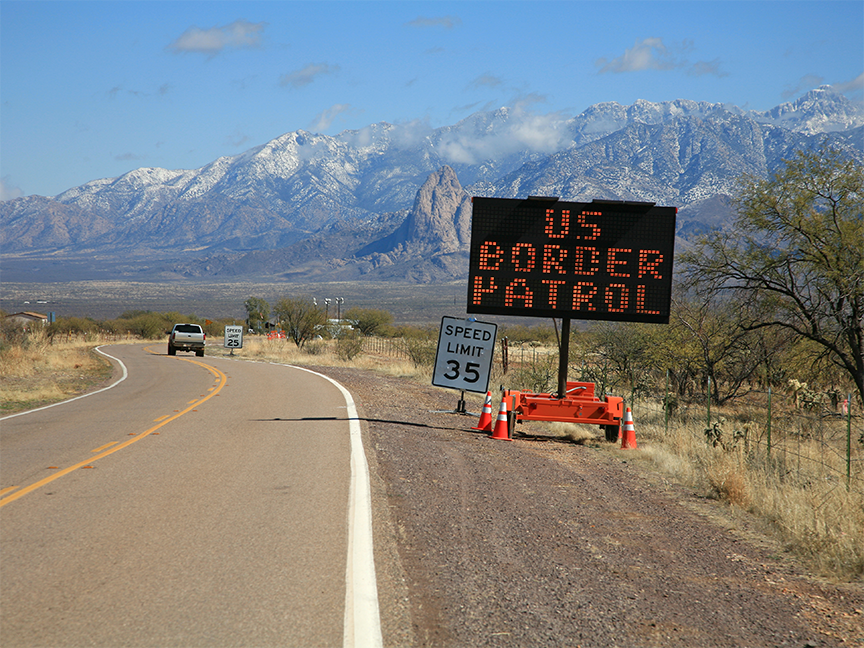
Visit Our Sponsors |
|
|
|
|
|
|
|
|
|
|
|
|
|
|
|
|
|
|
|
|
|
|
|
|
|
|
|
|
|
|
|
|
|
|
|
|
|
|

A new U.S. requirement that went into effect January 22 requires any essential workers crossing the border into the U.S. to be vaccinated. And that includes truckers.
“It’s one extra challenge for an already very strained supply chain industry, especially when it comes to going across the U.S.-Mexico border,” says Luis Garcia, head of carrier relations at New York-based Nuvocargo Inc., provider of a digital platform for managing cross-border trade between the U.S. and Mexico. “Although COVID-19 testing is not a requisite at this time, vaccinations are now key to enabling the supply chain,” adds Josefina Blanco, legal and compliance lead at Nuvocargo.
The U.S.-Mexico trade lane has already suffered greatly under the pandemic, with significant delays coming on top of driver shortages caused by people falling sick with the Omicron variant.
Garcia points out Mexican shippers and truckers already have a fresh burden to bear with the January 1 introduction of the Mexican Miscellaneous Tax Resolution for 2022 — also known as the Complemento Carta Porte — which adds hefty new documentation requirements for cargo moving in, out and within Mexico. The measure is an attempt to reduce cargo theft and the movement of contraband, and the associated loss in tax revenues. The associated questionnaire has up to 160 fields to be filled out by the carrier, also including information from the shipper, and can take two to five hours to complete before the shipment leaves the point of origin.
Garcia points out the new tax law intersects with the vaccination requirement because the questionnaire requires specific information about the truck driver moving the cargo. If a driver has to be changed and reassigned for any reason, such as getting sick with COVID-19, then the bill of lading supplement needs to be done all over again, adding more hours of delay to the shipment.
And now, the U.S. Department of Homeland Security (DHS) requires non-U.S. individuals seeking entry into the U.S. through land ports of entry and ferry terminals at the U.S.-Mexico and U.S.-Canada borders to show proof of full vaccination for COVID-19. The requirement is enforced by U.S. Customs and Border Protection (CBP).
The new restrictions will apply only to non-U.S. individuals who are considered “essential” or “non-essential” workers, and not U.S. citizens, lawful permanent residents or U.S. nationals. Since truck drivers are considered essential workers under DHS regulations, those who are non-U.S. truck drivers will be required to get the COVID-19 vaccine and show proof of it when crossing the border between Mexico and the US.
Nuvocargo says after the new regulation was announced, its head of carrier relations reached out to carriers with drivers making transfers into the U.S., and most said they had been vaccinated in the U.S. in advance of the new regulation, after it was announced in October. But the company fears the new requirement will present more of a challenge for smaller operators, who might not be aware.
According to Nuvocargo, on the first day of the new law, some 66 drivers were turned back from the U.S.-Mexico border because they didn’t have adequate proof of vaccination. “So we know cross-border security is enforcing this,” Blanco says.
One extra complication is that not all vaccines supplied and administered in Mexico are approved for U.S. entry. For example, the CanSino and Sputnik vaccines, currently among those being offered in Mexico, are not acceptable.
The proof-of-vaccination requirement also applies to the U.S.-Canada border, of course, with predictions it will exacerbate supply chain issues for auto parts, according to NBC News. Earlier in January, the Canadian Trucking Alliance estimated around 12,000 drivers could be prohibited from entering the U.S. under the mandate. But it’s clear that the main burden of the new regulation will fall on the southern border.
Nuvocargo says it’s working closely with carriers to make sure all are aware of the new vaccination requirement. For shippers and carriers, the company strongly recommends planning ahead, expecting longer response times and delays, and being aware that capacity could be reduced even more than at present.
“It’s not clear whether this is a temporary thing,” Garcia says. “But I do know carriers should think of this as a long-term requirement, and organize their fleets accordingly.”
RELATED CONTENT
RELATED VIDEOS
Timely, incisive articles delivered directly to your inbox.

